Thesaurus : Doctrine

► Full Reference : E. Netter, "Les technologies de conformité pour satisfaire les exigences du droit de la compliance. Exemple du numérique" (Conformity technologies to meet the requirements of Compliance Caw. Digital example), in M.-A. Frison-Roche (dir.), L'obligation de Compliance, Journal of Regulation & Compliance (JoRC) and Dalloz, coll. "Régulations & Compliance", 2024, forthcoming.
____
📕read the general presentation of the book, L'obligation de Compliance, in which this contribution is published.
____
► English summary of this contribution (done by the Journal of Regulation & Compliance) :The author distinguishes between Compliance, which refers to Monumental Goals, and conformity, which are the concrete means that the company uses to tend towards them, through processes, check-lists in the monitoring of which the operator is accountable (art. 5.2. GRPD). Technology enables the operator to meet this requirement, as the changing nature of technology fits in well with the very general nature of the goals pursued, which leave plenty of room for businesses and public authorities to produce soft law.
The contribution focuses firstly on existing technologies. Through Compliance, Law can prohibit a technology or restrict its use because it runs counter to the goal pursued, for example the technology of fully automated decisions producing legal effects on individuals. Because it is a perilous exercise to dictate by law what is good and what is bad in this area, the method is rather one of explicability, i.e. control through knowledge by others.
Regulators are nevertheless developing numerous requirements stemming from the Monumental Goals of Compliance. Operators must update their technology or abandon obsolete technology in the light of new risks or to enable effective competition that does not lock users into a closed system. But technological power must not become too intrusive, as the privacy and freedom of the individuals concerned must be respected, which leads to the principles of necessity and proportionality.
The author stresses that operators must comply with the regulations by using certain technologies if these technologies are available, or even to counteract them if they are contrary to the goals of the regulations, but this obligation of conformity is applied only if these technologies are available. The notion of "available technology" therefore becomes the criterion of the obligation, which means that its content varies with circumstances and time, particularly in the area of cybersecurity.
In the second part of this contribution, the author examines technologies that are only potential, those that Law, and in particular the courts, might require companies to invent in order to fulfill their conformity obligation. This is quite understandable when we are talking about technologies that are in the making, but which will come to fruition, for example in the area of personal data transfer to satisfy the right to portability (GRPD), or where companies must be encouraged to develop technologies that are of less immediate benefit to them, or in the area of secure payment to ensure strong authentication (SPD 2).
This is more difficult for technologies whose feasibility is not even certain, such as online age verification or the interoperability of secure messaging systems, two requirements which appear to be technologically contradictory in their terms, and which therefore still come under the heading of "imaginary technology". But Compliance is putting so much pressure on companies, particularly digital technology companies, that considerable investment is required to achieve it.
The author concludes that this is the very ambition of Compliance and that the future will show how successful it will be.
____
🦉This article is available in full texte for persons following Professor Marie-Anne Frison-Roche teaching.
________
Thesaurus : Doctrine
Référence complète : Gibert, M., Faire la morale aux robots. Une introduction à l'éthique des algorithmes, Flammarion, 2021, 168 p.

May 4, 2025
Publications

🌐follow Marie-Anne Frison-Roche on LinkedIn
🌐subscribe to the Newsletter MAFR Regulation, Compliance, Law
🌐subscribe to the Video Newsletter MAFR Overhang
🌐subscribe to the Newsletter MaFR Droit & Art
____
 ► Full Reference: M.-A. Frison-Roche, Compliance law as a Royal Road for regulating the Digital Space, Working Paper, May 2025
► Full Reference: M.-A. Frison-Roche, Compliance law as a Royal Road for regulating the Digital Space, Working Paper, May 2025
____
📝 This Working Paper is the English basis for an article written in French "Le Droit de la compliance, voie royale pour réguler l'espace numérique", in 📕
____
► Summary of this Working Paper: In order to describe the role of Compliance Law in regulating the digital space and to conclude that this new branch of Law is the 'royal road' to this end, this study proceeds in 6 stages. Firstly, at first sight and conceptually, there is a gap between the political idea of Regulating and the ideas (freedom and technology as 'law') on which the digital space has been built and is unfolding. Secondly, in practice, there is such a huge gap between the ordinary methods of Regulatory Law, which are backed by a State, and the organisation of the Digital Space by these economic operators, that are both American and global. Thirdly, the political claim to civilise the Digital Space remains and is growing, relying on the very strength of the entities capable of realising this ambition, these entities being the crucial digital operators themselves, seized as Ex Ante. Fourthly, it corresponds to the conception and practice of a new branch of Law, Compliance Law, which should not be confused with "conformity" and which is normatively anchored in its "Monumental Goals". Fifthly, Compliance Law internalises Monumental Goals in the digital operators which disseminate them through structures and behaviours in the digital space. Sixthly, through the interweaving of legislation, court rulings and corporate behaviour, the Monumental Goals are given concrete expression, willingly or by force, in ways that can civilise the digital space without undermining the primacy of freedom.
____
🔓read the Working Paper below⤵️
April 18, 2024
Thesaurus : Doctrine
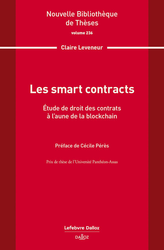
► Référence complète : C. Leveneur, Les smart contracts. Étude de droit des contrats à l'aune de la blockchain, préf. C. Pérès, Dalloz, coll. "Nouvelle Bibliothèque de Thèses", vol. 236, 2024, 621 p.
____
____
📗lire le sommaire de l'ouvrage
____
📗lire la table des matières de l'ouvrage
____
► Résumé de l'ouvrage (fait par l'éditeur) : "La recherche menée sur les smart contracts a pour objectif de comprendre et d'analyser une innovation technologique à la lumière du droit des contrats, afin de permettre l'utilisation de ces instruments au service de l'efficacité économique des contrats, grâce à des adaptations à la fois technologiques et juridiques.
Des programmes informatiques auto-exécutants, appelés «smart contracts », peuvent être déployés sur des blockchains afin d'exécuter automatiquement des actions prédéfinies, répondant à des conditions déterminées. Une fois enregistré sur une blockchain, le programme est à la fois vérifiable par tous et immuable, ce qui constitue une véritable garantie pour les parties qui l'utilisent. De plus, le smart contract bénéficie d'une autonomie dans l'exécution dès lors que les conditions prédéfinies sont indiquées comme remplies, chassant l'aléa ou l'erreur humaine.
Dans une blockchain, toutes les transactions sont en réalité opérées par des smart contracts. Le smart contract le plus simple envoie des fonds d'une adresse A vers une adresse B. Des smart contracts plus élaborés permettent de programmer des conditions, et par exemple de proposer des prêts à intérêts, de mettre en place des garanties, etc. C'est ce que l'on appelle la finance décentralisée (DeFi). Un smart contract peut également être programmé pour créer des crypto-actifs, par exemple des jetons numériques (tokens), les vendre, prévoir l'équivalent d'un droit de suite, etc. Les jetons non fongibles (NFT) fonctionnent ainsi grâce à des smart contracts.
Les smart contracts sont les rouages indispensables de cette grande « machine de confiance » qu'est la blockchain.
Parmi tous les smart contracts, une forme est apparue particulièrement intéressante pour une analyse juridique. lI s'agit du cas où le smart contract semble non seulement faire vivre une relation contractuelle, mais aussi matérialiser une offre et un mode d'acceptation. Ainsi, au-delà d'être de simples rouages techniques pour des cas d'usage de al blockchain, les smart contracts peuvent être utilisés au service de l'exécution de contrats déjà formés, voire être le support et l'expression de contrats à part entière. Tele est la thèse soutenue dans cette étude.".
________
April 15, 2024
Thesaurus : Doctrine
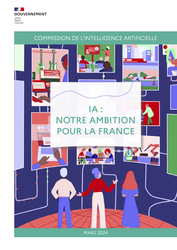
► Référence complète : Commission de l'intelligence artificielle, présidée par Ph. Aghion et A. Bouverot, IA : notre ambition pour la France, Rapport remis au Premier ministre, mars 2024, 130 p.
____
________
Nov. 17, 2023
Thesaurus : Doctrine
► Référence complète : P. Barban, "Le cadre européen relatif aux technologies de registre distribué et à la blockchain – Analyse critique des nouvelles techniques législatives en droit de l’Union", Revue des Affaires Européennes (R.A.E.), 2023/2, pp. 487-500
____
► Résumé de l'article (fait par l'auteur) : "The emergence and deployment of distributed ledger technology, including blockchain, has led to the emergence of tokens that are traded and speculated on. The European Union has decided to regulate these tokens. Faced with a protean object and a risk of destabilising the regulatory structure of financial law, it has used several new legislative techniques, namely experimentation and replication. The aim of this study is to analyse both the substance of these regulations and to take a critical look at these new methods, which are likely to be used again in the future."
(Free translation : "L'émergence et le déploiement de la technologie des registres distribués, dont la blockchain, a conduit à l'émergence de jetons qui font l'objet d'échanges et de spéculations. L'Union européenne a décidé de réglementer ces jetons. Face à un objet protéiforme et à un risque de déstabilisation de l'édifice réglementaire du droit financier, elle a eu recours à plusieurs nouvelles techniques législatives, à savoir l'expérimentation et la réplication. L'objectif de cette étude est d'analyser à la fois le contenu de cette réglementation et de porter un regard critique sur ces nouvelles méthodes, susceptibles d'être réutilisées à l'avenir.")
____
🦉Cet article est accessible en texte intégral pour les personnes inscrites aux enseignements de la Professeure Marie-Anne Frison-Roche
________
Sept. 1, 2023
Thesaurus : Doctrine
► Référence complète : J. Groffe-Charrier, "Contrôle de l’âge du public de contenus pornographiques : l’ouverture de la boîte de Pandore ?", Communication-Commerce électronique, n° 9, septembre 2023, pp. 1-4
____
► Résumé de l'article (fait par l'auteure) : "La protection des mineurs en ligne se traduit notamment, pour le Gouvernement, par la nécessité de contrôler l’âge des utilisateurs de sites proposant des contenus pornographiques, afin d’épargner les plus jeunes. Toutefois, si l’objectif est louable, les solutions envisagées ne sont pas sans risque et mettent en lumière les limites de la règle légale.".
____
🦉Cet article est accessible en texte intégral pour les personnes inscrites aux enseignements de la Professeure Marie-Anne Frison-Roche
________
Nov. 9, 2022
Thesaurus : Doctrine
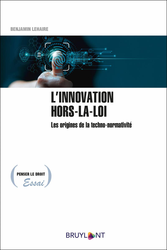
► Référence complète : B. Lehaire, L'innovation hors-la-loi. Les origines de la techno-normativité, Bruylant, coll. "Penser le droit", 2022, 275 p.
____
____
📗lire le sommaire de l'ouvrage
____
📗lire la table des matières de l'ouvrage
____
► Résumé de l'ouvrage (fait par l'éditeur) : "Le droit est-il incapable d’encadrer l’innovation technologique ? L’idée est véhiculée ici et là comme un constat désarmant toute tentative de légiférer sur le "nouveau", en raison principalement du rythme incessant de l’innovation.
L’innovation est devenue un phénomène total entrainant des conséquences sociales réelles.
La principale est sans doute l’injonction faite à tous de l’accueillir, quand il ne s’agit pas de l’encourager. Tous les champs de la société sont concernés, y compris le champ juridique.
En droit, l’injonction normative tend à faire émerger ce qu’il convient désormais d’appeler une techno-normativité, entendue comme la potentielle normativité juridique de la technique.
Ce livre, unique sur le marché, propose une réflexion sur le rôle du droit dans notre société, à la fois comme vecteur de techno-normativité mais aussi comme solution ou limitation des effets négatifs de la technologie sur la société.
En partant des écrits les plus récents sur la philosophie, la sociologie et le monde numérique, l’ouvrage propose une lecture critique du rapport entre droit et innovation qui intéressera tant un public universitaire qu’un public de professionnels du numérique.".
________
Dec. 14, 2021
Thesaurus : Doctrine
► Référence complète : Labbée, Th, N., Le droit face aux technologies disruptives : : le cas de la blockchain, Thèse Strasbourg, 2021.
____
_________
Sept. 1, 2021
Compliance: at the moment
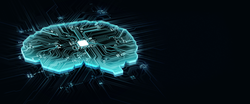
► An article published on July 14, 2021 by The Wall Street Journal, "Brain Implant Lets Man 'Speak' After Being Silent for More Than a Decade", relays the information that it is now possible, on an experimental basis, to implant in the brain a device allowing a person deprived by a neurological accident to speak to be able to express himself again by writing his thoughts directly on a computer screen, on which the words thought are displayed in sentences.
____
Several years of "fundamental" research, notably on the part of Facebook, which, in particular by subsidizing the French professor of neurosciences Stanislas Dehaene, in a comparison between the learning development of the brain and the development of "deep learning", have been successful. to allow people who have lost the use of the voice to write directly on screens without this vocal medium by going directly from thought to writing.
This leads to three reflections, putting Law and Technology at the center:
1. at first glance, speech being only a medium between thought and expression, it would be conceivable to do without it;
2. However, it is required to draw a parallel with the new technology of "emotional recognition" by which thoughts are accessible to third parties, which thwarts the fundamental right to make one's thoughts inaccessible to others;
The news has shown precisely that this technology, making possible to capture the true thoughts of others despite feigned facial expressions, poses a problem with regard to the fundamental right to lie or to remain silent (see in this regard 📧 MaFR, "Compliance and Ethics Technologies may be inadmissible "in themselves" and conceiving of their "ethical use" is therefore not admissible: practical case on the control of workers' emotions ").
3. By anticipating the possible use of this new technology and the legal reaction to this potentiality, the same question raises whether, per se, such an implantation of a tool for "capturing thoughts directly in the brain" to obtain their "direct translation on a screen" should not be considered as the equivalent of capturing thoughts, just as infringing on everyone's fundamental right to keep their thoughts inaccessible.
Here again, the fact that in one or two cases, this made it possible to cure a person does not legitimize the technology in itself.
Likewise, the fact that the person "consents" is not sufficient to legitimize what may be a per se attack on the dignity of the human person if the technology has the effect of capturing thoughts with a loss of control. the person concerned. For the moment, in the description given by the researchers according to the article which relates the innovation, it is the transmitter who controls the technology but the elimination of the medium of speech or writing deserves to be conceptualized, in the loss of isolation of the individual, isolation to which the Western tradition has often associated Freedom.
_____
Aug. 30, 2021
Compliance: at the moment

► An article from March 3, 2021, Smile for the camera: the dark side of China's emotion-recognition tech, then an article from June 16, 2021, "Every smile you fake" - an AI emotion - recognition system can assess how "happy" China's workers are in the office describes how a new technology of emotional recognition is able, through what will soon be out of fashion to call "facial recognition", to distinguish a smile that reflects a mind state of real satisfaction from a smile which does not correspond to it. This allows the employer to measure the suitability of the human being for his or her work. It is promised that it will be used in an ethical way, to improve well-being at work. But isn't it in itself that this technology is incompatible with any compensation through ethical support?
The technology developed by a Chinese technology company and acquired by other Chinese companies with many employees, allows to have information on the actual state of mind of the person through and beyond his or her facial expressions and bodily behavior.
Previously, the technology of emotional recognition had been developed to ensure security, by fighting against people with hostile plans, public authorities using it for example in the controls at airports to detect the criminal plans which some passengers could have.
It is now affirmed that it is not about fighting against some evil people ("dangerousness") to protect the group before the act is committed ("social defense”) but that it is about helping all workers.
Indeed, the use that will be made of it will be ethical, because first the people who work for these Chinese companies with global activity, like Huawaï, do it freely and have accepted the operation of these artificial intelligence tools (which is not the case with people who travel, control being then a kind of necessary evil that they do not have to accept, which is imposed on them for the protection of the group), but even and above all, the purpose is itself ethical: if it turns out that the person does not feel well at work, that they are not happy there, even before they are perhaps aware, the company can assist.
Let’s take this practical case from the perspective of Law and let’s imagine that it is contested before a judge applying the principles of Western Law.
Would this be acceptable?
No, and for three reasons.
1. An "ethical use" cannot justify an unethical process in itself
2. The first freedoms are negative
3. "Consent" should not be the only principle governing the technological and digital space
I. AN "ETHICAL USE" CAN NEVER LEGITIMATE AN UNETHICAL PROCESS IN ITSELF
These unethical processes in themselves cannot be made "acceptable" by an "ethical use" which will be made of them.
This principle was especially reminded by Sylviane Agacinski in bioethics: if one cannot dispose of another through a disposition of his or her body which makes his or her very person available (see not. Agacinski, S., ➡️📗Le tiers-corps. Réflexions sur le don d’organes, 2018).
Except to make the person reduced to the thing that his or her body is, which is not ethically admissible in itself, that is excluded, and Law is there in order to this is not possible.
This is even why the legal notion of "person", which is not a notion that goes without saying, which is a notion built by Western thought, acts as a bulwark so that human beings cannot be fully available to others, for example by placing their bodies on the market (see Frison-Roche, M.-A., ➡️📝To protect human beings, the ethical imperative of the legal notion of person, 2018). This is why, for example, as Sylviane Agacinski emphasizes, there is no ethical slavery (a slave who cannot be beaten, who must be well fed, etc.).
That the human being agrees ("and what about if it pleases me to be beaten?") does not change anything.
II. THE FIRST FREEDOM IS THE ONE TO SAY NO, FOR EXAMPLE BY REFUSING TO REVEAL YOUR EMOTIONS: FOR EXAMPLE HIDING IF YOU ARE HAPPY OR NOT TO WORK
The first freedom is not positive (being free to say Yes); it is negative (being free to say No). For example, the freedom of marriage is having the freedom not to marry before having the freedom to marry: if one does not have the freedom not to marry, then the freedom to marry loses any value. Likewise, the freedom to contract implies the freedom not to contract, etc.
Thus, freedom in the company can take the form of freedom of speech, which allows people, according to procedures established by Law, to express their emotions, for example their anger or their disapproval, through the strike.
But this freedom of speech, which is a positive freedom, has no value unless the worker has the fundamental freedom not to express his or her emotions. For example if he or she is not happy with his or her job, because he or she does not appreciate what he or she does, or he or she does not like the place where he or she works, or he or she does not like people with whom he or she works, his or her freedom of speech demands that he or she have the right not to express it.
If the employer has a tool that allows him or her to obtain information about what the worker likes and dislikes, then the employee loses this first freedom.
In the Western legal order, we must be able to consider that it is at the constitutional level that the infringement is carried out through Law of Persons (on the intimacy between the Law of Persons and the Constitutional Law, see Marais , A., ➡️📕Le Droit des personnes, 2021).
III. CONSENT SHOULD NOT BE THE ONLY PRINCIPLE GOVERNING THE TECHNOLOGICAL AND DIGITAL SPACE
We could consider that the case of the company is different from the case of the controls operated by the State for the monitoring of airports, because in the first case observed people are consenting.
"Consent" is today the central notion, often presented as the future of what everyone wants: the "regulation" of technology, especially when it takes the form of algorithms ("artificial intelligence"), especially in digital space.
"Consent" would allow "ethical use" and could establish the whole (on these issues, see Frison-Roche, M.-A., ➡️📝Having a good behavior in the digital space, 2019).
"Consent" is a notion from which Law is today moving away in Law of Persons, in particular as regards the "consent" given by adolescents on the availability of their body, but not yet on digital.
No doubt because in Contract Law, "consent" is almost synonymous with "free will", whereas they must be distinguished (see Frison-Roche, M.-A., ➡️📝Remarques sur la distinction entre la volonté et le consentement en Droit des contrats, 1995).
But we see through this case, which precisely takes place in China, that "consent" is in Law as elsewhere a sign of submission. It is only in a probative way that it can constitute proof of a free will; this proof must not turn into an irrebuttable presumption.
The Data Regulatory Authorities (for example in France the CNIL) seek to reconstitute this probative link between "consent" and "freedom to say No" so that technology does not allow by "mechanical consents", cut off from any connection with the principle of freedom which protects human beings, from dispossessing themselves (see Frison-Roche, M.-A., Yes to the principle of will, No to pure consents, 2018).
The more the notion of consent will be peripheral, the more human beings will be able to be active and protected.
________
April 21, 2021
Thesaurus : Doctrine
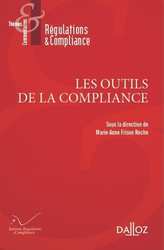
► Full Reference: S. Merabet, "La morale by design" ("Morality by design"), in M.-A. Frison-Roche (ed.), Les outils de la Compliance, coll. "Régulations & Compliance", Journal of Regulation & Compliance (JoRC) and Dalloz, 2021, p. 287-298.
____
📕read a general presentation of the book, Les outils de la Compliance, in which this article is published
____
► Summary of the article (done by the Journal of Regulation & Compliance): After having wondered about the relationship between Law and Morality, for which it is difficult to find points of contact, the author advances the hypothesis that the latter could find a space of concretization in the technology of artificial intelligence, even though many are worried about the deleterious effects of it. The author considering that Compliance is only a method while ethics would be the way in which morality is incorporated in a relaxed way in Law, the technology known as Artificial Intelligence could therefore express the moral rule ("compliance by design could be the appropriate tool to ensure the effectiveness of moral rules without falling into the excesses envisaged").
The author draws on examples to estimate that thus technology for on the one hand expressing the moral rule and on the other hand making it effective. The moral rule can thus be drawn up in a balanced way since it is jointly developed between the State and the economic operators, this collaboration taking the form of general principles adopted by the State using the means chosen by the company. Its content would also be characterized by the search for a "right balance", which would be found by this distribution between the primary moral principles whose expression would be the act of the State and the secondary moral principles whose expression would be delegated to companies.
Taking therefore what would be the principles of Compliance, the author applies them to Artificial Intelligence, showing that these technologies include not only the principle of neutrality but also the ethical principles of non-maliciousness, even of benevolence. (first principles) that companies then decline into secondary principles. Therefore, "compliance can usefully be used to convert these fundamental moral principles into derived moral rules, a source of greater effectiveness.".
Thus resulting in a "moral by design", the overall system has an additional effectiveness tool. This supposes that the fundamental and derived rules are of an acquired moral quality because for the moment the technological tool can only ensure their effectiveness and not the moral quality of the implemented rules. In determining the "moral rules of application", the company has margins of freedom, used through technological tools.
________
Dec. 8, 2020
Thesaurus : Doctrine

► Référence complète : A. Trescases, "Le risque", in J.-B. Racine (dir.), Le droit économique au XXIe siècle. Notions et enjeux, LGDJ, coll. "Droit & Économie", 2020, pp. 655-670
____
📕consulter une présentation générale de l'ouvrage, Le droit économique au XXIe siècle. Notions et enjeux, dans lequel cet article est publié
____
► Résumé de l'article :
____
🦉Cet article est accessible en texte intégral pour les personnes inscrites aux enseignements de la Professeure Marie-Anne Frison-Roche
________
Oct. 9, 2020
Thesaurus : Soft Law
Full reference: Financial Stability Board, The Use of Supervisory and Regulatory Technology by Authorities and Regulated Institutions. Market Developments and Stability Implications, Report of 9th of October 2020, 36 p.
Read the presentation of the report by the Financial Stability Board
To go further on the question of the use of new technologies in regulatory processes, read Marie-Anne Frison-Roche's working paper: Analysis of blockchains with regards with the uses they can fulfill and the functions that the ministerial officers must ensure
Aug. 31, 2020
Newsletter MAFR - Law, Compliance, Regulation

Full reference: Frison-Roche, M.-A., Compliance by Design, a new weapon? Opinion of Facebook about Apple new technical dispositions on Personal Data protection, Newsletter MAFR - Law, Compliance, Regulation, 31st of August 2020
Read by freely subscribing other news of the Newsletter MAFR - Law, Compliance, Regulation
Summary of the news:
Personal Data, as they are information, are Compliance Tools. They represent a precious resource for firms which must implement a vigilance plan in order to prevent corruption, money laundering or terrorism financing, for examples. It is the reason why personal data are the angular stone of "Compliance by design" systems. However, the use of these data cannot clear the firm of its simultaneous obligation to protect these same personal data, that is also a "monumental goal" of Compliance Law.
In order to be able to exploit these data in an objective of Compliance and protecting them in the same time, the digital firm Apple adopted for example new dispositions in order to the exploitation of the Identifier For Advertisers (IDFA) integrated in the iPad and in the iPhone and broadly used by targeted advertising firms, is conditioned to the consumer's consent.
Facebook reacted to this new disposition explaining that such measures will restrict the access to data for advertisers who will suffer from that. Facebook suspects Apple to block the access to advertisers in order to develop its own advertising tool. Facebook guaranteed to advertisers who work with it that it will not take similar measures and that it will always favor consultation before decision making in order to concile sometimes divergent interests.
We can sleep and already make some remarks:
- GDPR imposing to companies that they guarantee a minimal level of protection for personal data does not apply in the United-States. It is then possible that Apple acted through Corporate Social Responsibility (CSR), more than through legal obligation.
- The mode of regulation used here is the "conversational regulation" theorized by Julia Black. Indeed, regulators let the forces in presence discuss.
- This "conversational regulation" does not seem to be very efficient in this case and an intervention of administrative authorities or of judges could be justified via Competition Law, Regulation Law or Compliance Law, knowing that Competition Law will favor access right to information and Regulation or Compliance Law private life right.
The whole paradox of Compliance Law rests in the equilibrium between circulation of information and secret.
Feb. 20, 2020
Thesaurus : Doctrine
Référence complète : Mounoussamy, L., Le smart contract, acte ou hack juridique ?, in Petites Affiches, n°37, 20 février 2020, pp. 12-19.
Résumé par les Petites Affiches : Dans cet article, l'auteur analyse l'arrivée du smart contract, système innovant né du développement des nouvelles technologies, dans un environnement juridique déjà structuré. Il commence par définir la nature du smart contract, et le positionne dans cet ensemble juridique mondialisé. Il en présente les impacts et les perspectives de développement, les forces et les faiblesses ainsi que l'intime relation que noues les technologies informatiques et le droit. Le smart contract est un outil dont l'utilisateur définira s'il viendra disrupter le contrat ou le parfaire.
Sept. 8, 2019
Blog

I go. In accordance with the European Regulation (GDPR) transposed into French legal system, the site informs that there is possibility for the user to accept or refuse the use of their personal data for the benefit of "partners".
If they continue reading, the user is supposed to accept everything, but they can click to "customize".
I click: there I find two options: "accept everything" or "reject everything". But the "reject all" option is disabled. It is only possible to click on the "accept all" option.
It is stated in a text, which can not be copied, that these "partners" can use my data without my consent and for purposes that they do not have to inform me. But, again, these things I can "refuse everything". Here again the "reject all" mention exists but the fonctionality is not active, while the mention "accept all" is an active fonctionality.
While believing to read a free article on the "right of the trees".
At the end, I do not read this article, since I did not click on the only active buttons: "accept everything".
In exchange for a whimsical article about trees and their rights, or creams to be always young, or celebrities who change spouses, or about so-called tests to find what king or queen you should be if the all recognized all your merits, etc.
Proposed on the digital news feed by unknown sites; in partnership with foreign companies that you will never reach.
And mass-viewed by Internet users who are also told that "consent" is the proven solution for effective protection ....
While these are just panels hastily built by new Potemkins ...
June 20, 2019
Publications
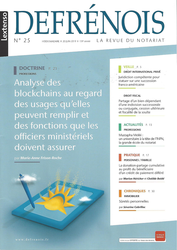
Référence complète : Frison-Roche, M.-A., Analyse des blockchains au regard des usages qu'elles peuvent remplir et des fonctions que les officiers ministériels doivent assurer, in Revue Défrenois, Lextenso, n°25, 20 juin 2019, pp. 23-29.
Résumé : La blockchain est une technologie qui n'est pas, en soir, bonne ou mauvaise. Elle est plus ou moins adaptée aux fonctions qu'elle est apte à remplir. Ce qu'il faut ensuite confronter aux fonctions que l'État a dévolues aux officiers ministériels. Or, autant les fonctions de conservation et de duplication des actes gagnent à être transférées et développées dans cette technologie, autant la fonction d'élaboration des instrumentums ne peut être assumée que par des officiers ministériels auxquels l'État demande de vérifier la correspondance entre les mentions des instrumentums et la réalité des négotiums, ce que seuls des êtres humains peuvent mener et ce qu'aucune machine ne peut faire.

Updated: May 27, 2019 (Initial publication: May 13, 2019)
Publications

First of all, this working document was used as a support for an oral intervention done in French on the general topic. L'officier ministèriel est-il soluble dans la blockchain ? (Is the ministerial officer soluble in the blockchain?) at the "Club du Droit", which took place at the Conseil supérieur du Notariat on May 14, 2019, in Pars.
Consult the general presentation of the conference (in French).
Then it serves as a basis for an article to be published in the Revue Defrénois (in French).
______
Introduction & Summary.
The technical analysis of the confrontation between the tool that is the blockchain and the function that ensure these particular people who are the "ministerial officers"
For this, it is necessary to keep in mind this distinction so simple: the blockchain is a tool, a thing, a machine, an algorithm, a mechanical, mathematical power, while the ministerial officer is a human being.
This refers to the distinction that the Western legal system, whether Civil Law or Common Law, poses as summa divisio: the distinction between human beings and things. This first distinction is formulated so that we do not treat human beings as things, since they are legally qualified as "person"
For this essential distinction to remain effective, not only should we not imagine human beings as things (reduced to their bodies, for example, or reduced to mechanical acts of consumption
But technology represents more and more things with anthromophormi forms and reactions , through robots which "speak", "intelligent" machines, etc. The economic success of promoters of machines and other human-like robots, mechanical solutions presented as "intelligent", is based on forgetting the distinction between the person and things. It is certainly possible to erase this distinction from our system of thought. The difficulty is that it is the basis of Western Lawl
It is this background that is played in the practical questiond of insertion of blockchains and other technologies and the way in which the various professions must exercise their functions today. If these tools are consistent with these functions, or even improve them, professionals must welcome them without suspicion, or even participate directly in developing them. If these tools are not capable of fulfilling certain functions entrusted to these professionals, then these functions must not be inadvertently or maliciously inserted into a blockchain, whose capacity for preservation and reliability does not amount to anything, because a thing doesn't have any ability to think.
This is why we must start from the functions, by dinstinguising the technical function of conservation, duplication and elaboration of acts (I).
It seems that assuming the technical reliability of preservation and duplication acquired through the blockchain, as soon as there is a part of elaboration in the act, human intervention must step in because a machine is unfit to check the facts. Here we find the distinction between the retranscribed negotium, this retranscription never being mechanical, and the instrumentum itself, which, split from what gave rise to it, can be subjected to duplicative and conservation technologies. These technologies of conservation and duplication could be so efficient that the notions of original and copy could be questioned because of the reliability of the blockchain (II).
Thus the blockain is an effective technology on the instrumentum as documents divided from the negotium, but it can not guarantee the correspondence between the two ; it has only the reliability in the conservation, the availability and the duplication to infinity of the instrumentum, of what is extremely useful, and justifies that ministerial officers incorporate this technology. But the function of these are not limited to being agents of conservation and duplicators. We do not simply move from the copyist monk to the blockchain. The main and so precious function of the ministerial officers is to check the accuracy of the mentions of the instrumentum in relation to the reality of the negotium. This is so precious for a market economy to have this correspondance
This would be the choice of a very liquid and unsecured market (without intermediary, with the benefit of lower cost in Ex Ante and higher risk for the long term). In policy, the balance is always between security and liquidity, especillay in financial systemic policy. This was done by American Law, wich prefered low costs and high liquidity, especially for real estate loans, which were securitized by subprime mortgages. For the moment, this choice is not made in this sense by European Law, safety concern in the elaboration of the acts being preferred and the distinction between the human aptitude and the mechanical aptitude remaining. And we know that in the first system the reajustment takes the form of a general crisis, which reinjects the reality of the negotiums, lost in the instrumentums. What price are we ready to pay ?
Once this distinction is clearly made, because the elaboration of an acte mus be made bye the ministerial officer, human being invested by the State of the particular charge ensures the accuracy of the mentions of the act with the reality of people, wills, obligations and goods, it is all the more expedient for ministerial officiers to organize themselves to develop blockchain technology. Indeed, once this act has been developed reliably, ans as such deserves to be "authentic", because of the continuum between elaboration, preservation and duplication, because it is up to the ministerial officiers to draw up the deeds more incontestably reliable. It is up to them to equip themselves with the technological means of best conservation and duplication of acts elabored by them (IV).
Sur la confrontation déjà faite dans l'analyse économique de la "régulation" et la fonction notariale, v. Frison-Roche, M.-A., ....
Frison-Roche, M.A., Pour protéger les êtres humains, la nécessité éthique de la notion juridique de personne, 2018.
Anders, G., notamment dans son ouvrage central L'obsolescence de l'homme (1956), présentant l'être humain réduit à l'état de "machine désirante" par une société de pure et simple consommation. Le souci qu'il en a comme philosophe rejoint le souci qu'en avait Jacque Ellul, comme juriste, s'inquiétant de la "société technicienne" (...). Or, les machines correspondent aujourd'hui au dessin que ces auteurs du milieu du XXième siècle en faisaient. De la même façon, Alain Supiot rapporte à Kafka le souci du "machinisme" dans le fonctionnement des institutions humaines (....) ; il ne fait notamment dans son analyse de Kafka comme "artiste de la Loi" (2019).
Par exemple Supiot, A., La gouvernance par les nombres, 2015 ; Mondialisation ou globalisation ? Les leçons de Simone Weil, 2019 ; Le droit au XXIème siècle : droit, technique et écoumène (dernière leçon au Collège de France, 22 mai 2019).
Sur cette idée folle et dévastatrice qu'il faut faire davantage confiance aux machines qu'il ne faut faire confiance aux êtres humains, ce qui justifierait donc de "mécaniser" les autres humains, idée folle reprise le plus souvent par les auteurs avec entrain, v. par ex. Caprioli, E.A., La blockchain ou la confiance dans la technologie, JCP 2016. 672, n° 3.
Frison-Roche, M.-A., La disparition de la distinction de jure entre la personne et les choses : gain fabuleux, gain catastrophique, 2017.
Frison-Roche, M.-A., L'acte authentique, acte de marché, 2010.
May 14, 2019
Conferences
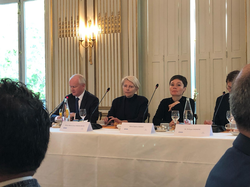
Référence complète : Frison-Roche, M.-A., participation à la table-ronde L'officier public ministériel est-il soluble dans la blockchain?, conférence-débat organisée par Le Club du Droit & le Conseil supérieur du Notariat, 14 mai 2019, Paris.
Consulter la présentation générale du colloque.
Consulter le document de travail sur la base duquel l'intervention a été faite.
Lire le compte-rendu qui en a été fait dans la presse.
Dans cette table-ronde, un professeur d'économie expose la dimension technologique et économique de la blockchain.
Puis est abordée la dimension juridique, dont l'exposé m'était plus particulièrement confié.
_____
A ce titre, après avoir replacé la question technique dans ce que doit garder le Droit, à savoir la distinction entre la Personne et les choses, ce que la technologie présentée aujourd'hui comme un ensemble de choses "intelligentes" et "décidantes" remettant en cause...., l'intervention porte sur 4 points (qui sont développés dans le document de travail).
En premier lieu, avant de porter une appréciation sur ce qui est adéquat et sur l'avenir il faut distinguer les fonctions techniques de conservation des actes, de duplication des actes et d'élaboration des actes, la distinction entre negotium et instrumentum n'étant en rien effacée par la technologie des blockchains.
En deuxième lieu, dès l'instant qu'il y a une altération substantielle de l'acte instrumentaire parce qu'un nouveau negotium a eu lieu, parce que les mentions doivent mesurer la reproduction de la réalité de ce qui fut décidé par les parties, l'on n'est plus dans l'acte de conserver et de dupliquer à l'identique, mais dans l'acte d'élaboration. Or, dans l'acte de conservation et de duplication, la blockchain peut être un atout technologique très précieux, en ce qu'à supposer sa fiabilité acquise, l'erreur étant exclue, c'est comme si l'on pouvait produire des originaux indéfiniment. La fiabilité est telle que la distinction entre original et copie n'aurait plus lieu d'être. Mais pour l'élaboration de l'instrumentum au regard du negotium , comment une machine pourrait-elle "dresser" un acte, c'est-à-dire en vérifier son rapport d'exactitude par rapport à la réalité ? Elle ne le peut pas. Seul un être humain le met, l'Etat ayant "déconcentré" son pouvoir de dresser uniléralement des actes (en cela, les notaires sont issus de la même idée de déconcentration....) en exigeant qu'ils vérifient la conformité à la réalité pour que l'incontestabilité soit ensuite attachée aux mentions.
En troisième lieu, il apparaît alors que la blockain est un outil de conservation et de duplication, mais que l'intermédiation d'un tiers de confiance humain vérifiant l'exactitude des mentions est nécessaire si l'on veut par sécurité que ce qui est dit dans l'acte écrit, puis conservé, puis dupliqué, soit la reproduction de la réalité. S'opère alors un choix de politique économique, souvent lié à la culture des pays. L'on peut considérer que le coût de l'intermédiation est élevé et qu'il faut mieux assumer le risque de l'inexactitude des mentions (quant aux parties, à la réalité de leur consentement, à la consistance de l'objet, à l'ampleur des obligations, etc.) et s'assurer ainsi un marché liquide. Le réajustement des actes par rapport à la réalité des choses se fait alors par la crise, qui réinjecte l'information, l'exemple en étant la crise des prêts immobiliers financiarisés des subprimes. C'est le choix anglais et américains. L'on peut préférer la sécurité par l'intermédiation en ralentissant le marché. C'est le choix du droit romano-germanique. Ces options demeurent ouvertes. La technologie du blockchain n'interfère pas, parce qu'elle ne doit pas viser l'établissement des actes. Si elle devait la viser, alors on aurait choisi la liquidité à la sécurité. Ou en termes plus généraux, l'on aurait choisi la Concurrence contre la Régulation. Mais plus que jamais le souci Ex Ante des risques systémiques (et le fossé entre la réalité et les actes qui doivent la transcrire est un risque systémique majeur) est premier.
En quatrième lieu, en ayant ainsi un tableau des fonctionnalités, l'on voit que les notaires peuvent avoir grand usage des blockchains. Sans laisser des machines établir des actes, ils peuvent les utiliser comme le furent des coffreforts et des photocopieuses, avec une fiabilité et une mise en commun que seul le numérique et la capacité de calcul peuvent offrir à travers cette nouvelle technologie. Plus encore, l'articulation de l'amont (élaboration) et de l'aval (conservation et duplication) étant de nouveau reconnue comme la plus efficace, les officiels ministériels sont les mieux placés, en tant qu'ils dressent des actes instrumentaires dont ils ont vérifié les mentions et après avoir conseillé les parties, à conserver et à dupliquer ceux-ci.
_____
Nov. 27, 2018
Publications
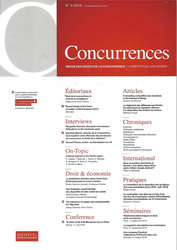
► Full Reference : Frison-Roche, M.-A., Droit de la concurrence et droit de la compliance ("Competition Law and Compliance Law), November 2018, in Revue Concurrences n° 4-2018, Art. n° 88053, pp. 1-4.
_____
► Summary: Compliance Law is a new branch of Law, still under construction. One can have a “narrow definition” of seeing it as the obligation of businesses to show that they are constantly and actively complying with the law. One can have a richer definition, of a substantive nature, defining it as the obligation or the own will of certain companies to achieve “monumental goals” that go beyond economic and financial performance. Competition Law partly integrates its two conceptions of Compliance: Precursor, Competition Law concretizes dynamically the first conception of Compliance Law. It is with more difficulties but also much more future that Competition Law can express in dialectic the second conception of Compliance Law as internationalization of these “monumental goals”, especially in the digital space.
📝 read the article (in French)
________
July 11, 2018
Thesaurus : Doctrine

Complete reference : Randell, Ch., How can we ensure that big Data does not make us prisoners of technology ?, Reuters Newsmaker event, London, 2018.
July 3, 2018
Thesaurus : Doctrine
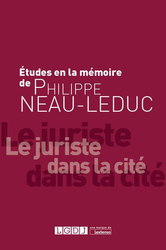
Référence complète : Caprioli, É.A., La blockchain dans la banque et la finance (éléments de réflexion juridique), in Études en l'honneur de Philippe Neau-Leduc, Le juriste dans la cité, coll. « Les mélanges », LGDJ- Lextenso, 2018, pp.189-206.
Lire une présentation générale dans lequel l'article est publié.
Jan. 10, 2018
Thesaurus : Doctrine
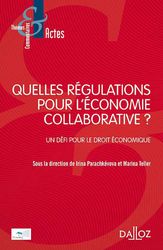
Référence complète : Parachkévova, I., et Teller, M., (dir.) Quelles régulations pour l'économie collaborative ? Un défi pour le droit économique, Dalloz, coll. "Thèmes et commentaires", 2018, 202 p.

Updated: Oct. 25, 2017 (Initial publication: May 27, 2016)
Publications

► Full Reference: Frison-Roche, M.-A., Globalization from the point of view of Law, working paper, May 2017.
____
🎤 This working paper initially served as a basis for a synthesis report made in French in the colloquium organized by the Association Henri Capitant in the International German Days on the subject of "Le Droit et la Mondialisation" (Law and Globalization).
📝 Il sert dans un second temps de base à l'article paru dans l'ouvrage La Mondialisation.
📝 it serves as a second basis for the article (written in English, with a Spanish Summary) to be published in the Brezilian journal Rarb - Revista de Arbitragem e Mediação (Revue d`Arbitrage et Médiation).
It uses the Bilingual Dictionary of the Law of Regulation and Compliance.
____
► Summary of the Working: Globalization is a confusing phenomenon for the jurist. The first thing to do is to take its measure. Once it has been taken, it is essential that we allow ourselves to think of something about it, even if we have to think about it. For example, on whether the phenomenon is new or not, which allows a second assessment of what is taking place. If, in so far as the law can and must "pretend" to defend every being, a universal claim destined to face the global field of forces, the following question - but secondary - is formulated: quid facere? Nothing ? Next to nothing ? Or regulate? Or can we still claim that the Law fulfills its primary duty, which is to protect the weak, including the forces of globalization?
____
read the Working Paper below⤵️